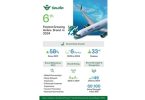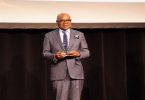The program’s technologies include:
- Testing a new fire extinguishing agent for aircraft that significantly reduces effects on the ozone layer. This material is intended to replace Halon 1301, which is no longer being produced.
- Collaborating with the U.S. National Oceanic and Atmospheric Administration to measure greenhouse-gas levels in the atmosphere to support the agency’s climate modeling and long-term forecasting.
- Evaluating acoustic lining concepts within the engine nacelle that may reduce noise on current engines and will inform designs for next-generation models.
- Recycling carbon composite material from Boeing 777X wing production into a cabin sidewall panel. This durable, light material would reduce fuel use and carbon emissions, and supports Boeing’s goals for sustainable manufacturing.
Boeing’s current and future airplanes leverage a number of technologies evaluated in previous ecoDemonstrator testing, including:
- Advanced Technology winglets on the 737 MAX family that reduce fuel use and emissions.
- iPad apps that provide real-time weather and other data to pilots, improving fuel efficiency and reducing CO2 emissions. These apps complement digital analytics services Boeing offers to help airlines optimize fleet utilization.
- A camera system on the new 777X that will enhance safety by helping pilots avoid obstacles on the ground.
“Boeing put additional emphasis on sustainability in 2020 to align with our stakeholder and business priorities as well as our values,” Boeing Chief Sustainability Officer Chris Raymond said. “Through our collaboration with industry partners, the ecoDemonstrator program is a great example of our commitment to work together to make flying safer and more sustainable for current and future generations.”
ecoDemonstrator test flights are flown on a blend of petroleum-based and sustainable aviation fuel. SAF is in regular use today, reduces life-cycle CO2 emissions by up to 80%, and offers the most immediate and greatest potential to reduce emissions over the next 20 to 30 years in all commercial aviation markets.
In January this year, Boeing committed to make sure its commercial airplanes are capable and certified to fly on 100% SAF by 2030. The company also plans to work with regulatory authorities and across the industry to raise the current 50% blending limit for expanded use of SAF. Boeing’s 2018 ecoDemonstrator 777 Freighter made history as the world’s first commercial airliner to fly on 100% sustainable fuel.






















